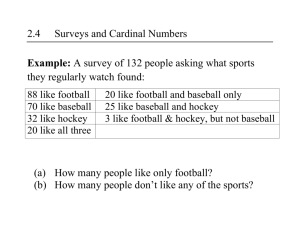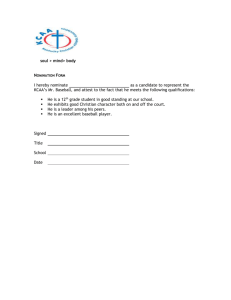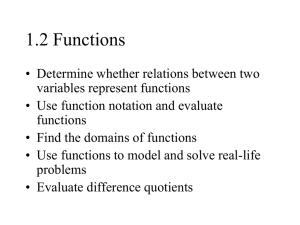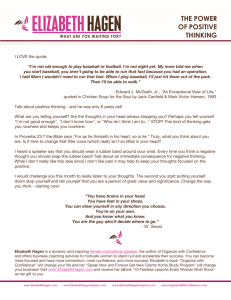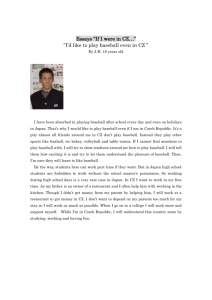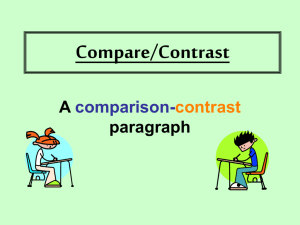Midterm Study Guide - Lake Dallas Middle School
advertisement
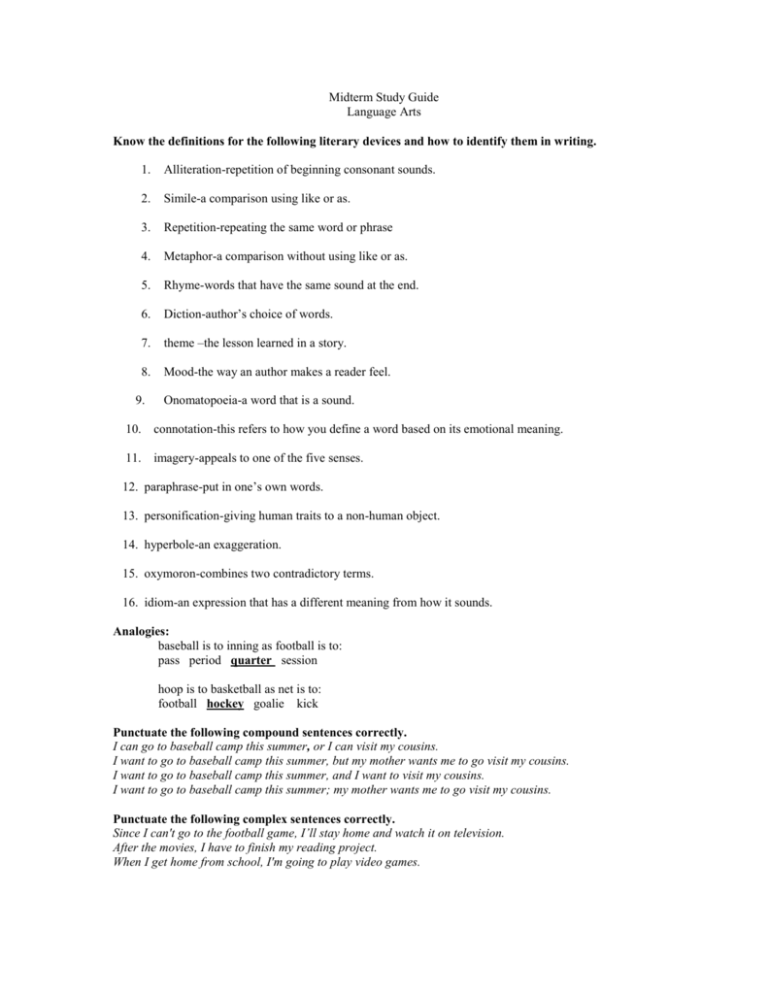
Midterm Study Guide Language Arts Know the definitions for the following literary devices and how to identify them in writing. 1. Alliteration-repetition of beginning consonant sounds. 2. Simile-a comparison using like or as. 3. Repetition-repeating the same word or phrase 4. Metaphor-a comparison without using like or as. 5. Rhyme-words that have the same sound at the end. 6. Diction-author’s choice of words. 7. theme –the lesson learned in a story. 8. Mood-the way an author makes a reader feel. 9. Onomatopoeia-a word that is a sound. 10. connotation-this refers to how you define a word based on its emotional meaning. 11. imagery-appeals to one of the five senses. 12. paraphrase-put in one’s own words. 13. personification-giving human traits to a non-human object. 14. hyperbole-an exaggeration. 15. oxymoron-combines two contradictory terms. 16. idiom-an expression that has a different meaning from how it sounds. Analogies: baseball is to inning as football is to: pass period quarter session hoop is to basketball as net is to: football hockey goalie kick Punctuate the following compound sentences correctly. I can go to baseball camp this summer, or I can visit my cousins. I want to go to baseball camp this summer, but my mother wants me to go visit my cousins. I want to go to baseball camp this summer, and I want to visit my cousins. I want to go to baseball camp this summer; my mother wants me to go visit my cousins. Punctuate the following complex sentences correctly. Since I can't go to the football game, I’ll stay home and watch it on television. After the movies, I have to finish my reading project. When I get home from school, I'm going to play video games. Be familiar with the elements of a plot diagram. 1. 2. 3. 4. 5. 6. exposition or introduction –beginning of a story. The characters and setting are introduced. initial action-The first event that begins the story. rising action-This part of the story begins to develop the conflict. climax-The turning point of the story. falling action-The conflict and climax are resolved or ended. denouement-The story comes to an ending. Know the following literary terms and their definitions. 1. setting-when and where the story takes place. 2. point of view-the perspective from which the story is told. 3. protagonist-the main character in the story. 4. antagonist-the character that opposes the protagonist. Greek and Latin Roots: act do aero air alt high amble walk or go andr/anthr man anim life or spirit aqua water art skill ast star aud hear belli war biblio book bio life cap head cardi heart chron time crat rule cred believe cycl ring, wheel, circle dem people dic speak doc teach duc lead fac/fic to make or do flect/flex to bend frag/fract to break gen birth, race, family geo earth gram/graph write hydra water jud/jus lab loc log luc/lum man mand meter mania miss/mit mort nat onym ortho path ped/pod phon photo pop port psych pul/pel ques rupt scop scrib sect sim solo law work place word light hand order measure madness send death born name straight feelings, sufferings foot sound light people carry mind force ask, seek break see write cut like alone Parts of Speech: Which category do the following words belong? in, without, angrily, her, or, Mrs. Stinnett, their, on, slowly, pretty, dog, computer, Lake Dallas Middle School, at, drive, purposefully, football, ran, below, and, she, June, or, bicycle, lovely, the, kind, yelled, basketball, he, Austin, helpful, pushed, joyfully, but common nouns: dog, computer, football, bicycle, basketball, pronouns: her, their, she, he proper nouns: Mrs. Stinnett, LDMS, Austin, June adjectives: pretty, lovely, kind, helpful action verbs: drive, yelled, pushed, ran adverbs: purposefully, joyfully slowly, angrily prepositions: on, at, below, in, without conjunctions: or, but, and Capitalization Rules: Which words need to be capitalized in the following sentences? 1. Aunt Mary was born on January 5 1945 in Ann Arbor Michigan on the coldest day of the year. 2. My oldest sister will marry her childhood sweetheart this spring. 3. Jane's family goes to Folly Beach every summer for a family reunion. 4. I can't wait to visit my cousins in Atlanta, Georgia, this summer. 5. Dear Mr. Smith: 6. Very truly yours, 7. My great grandfather served in World War I. 8. My mother bellowed, "Stop arguing right now!" 9. In the North, there were many jobs available. Comma Usage: Where would the commas go in the following sentences? 1. Grandma asked, "Will you help me bring in the groceries?" 2. She moved to Lake Dallas, Texas, from Nashville, Tennessee, two years ago. 3. Before we went to the park, we stopped at the grocery store and bought fried chicken, potato salad, bread and tea for a picnic. 4. My sister was born on November 26, 1959, in Charleston, South Carolina. 5. "I wish I didn't have to study for my history test," my little sister complained. There will questions over the following: "Demeter and Persephone" The Monsters Are Due On Maple Street When addressing a letter, where would you put the following information? Sender's Address: Recipient's Address: Sender’s Address goes in top left of envelope Recipient’s Address goes in the middle of the envelope. Multiple Meaning Words: The turtles crawled up on the bank of the river. A. The edge of the waterway B. A place to keep money C. To keep money in banks The student created a colorful art project. A. To throw forward B. To cause an image to appear C. a school assignment The children performed a play in the pavilion at the park. A. To participate in a game B. A show or performance C. To do something fun and amusing I went to the spring to get a bucket of water. A. To rise or leap in the air B. A place where water wells up in the ground C. A coiled piece of metal D. A season between summer and winter The tourists weren’t happy with the chilly welcome that they received from the hotel clerk. A. Cold B. Unfriendly The school newspaper was launched last week. A. To send in the air B. To start something new The creek runs through the park. A. The children run at gym class. B. The ink runs when it gets wet. C. The road runs across town. The scientist was an expert in the field of flowers. A. The school field was covered in yellow goldenrod. B. The baseball players spent the end of the inning in the field. C. The field of astronomy can be fascinating to study. The students hiked through a forest of palms. A. The greenhouse contained several palms. B. The burglar palmed the jewels. C. The preschoolers had paint all over their palms. One regulation is to park our cars in the other lot. That rule allows for customer parker close to businesses. A. Rule or law B. Irritation C. Problem I paved the parking lot. Now, we must wait until it dries. A. Painted the top of B. Covered the surface C. Cured it The red clay dirt was dense, not easily workable. I could not plant in that area. A. Mostly sand B. Wet and soggy C. Packed tightly together The student did not conform to conventional behavior. His behavior was not acceptable. A. Not approved B. Wild C. Generally accepted Her wedding gown was exquisite! Look at all the detail! A. Too extreme B. Simply made C. Elaborately made If you show him you’re vulnerable, the tiger will surely attack you. A. Weak B. Friendly C. Strong Of course, the hurricane could devastate our city, but we remain optimistic. A. Scared B. Hopeful C. Confused You can purchase jewelry that is invaluable, adequate, or even inexpensive. A. Clunky B. Cheap C. Precious The wall colors were subtle; I wanted bold colors like gold or red. A. Bright B. Child-like C. Delicate, faint My job as your troop leader is to give you guidance, support and character-building activities. A. Hope B. Direction C. faith
